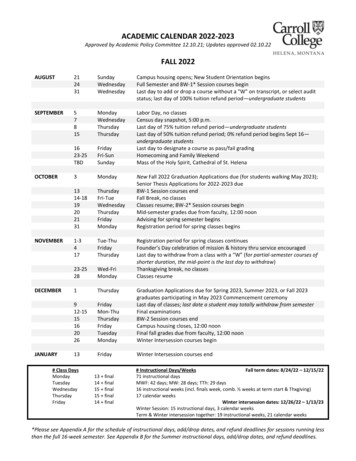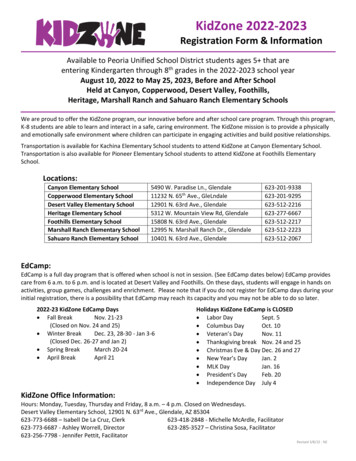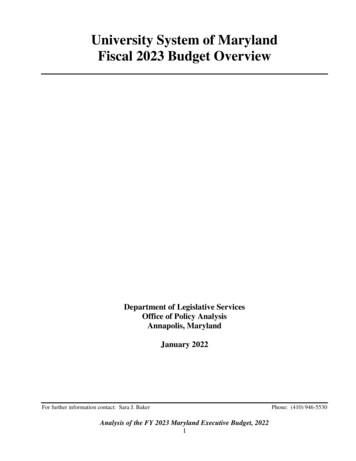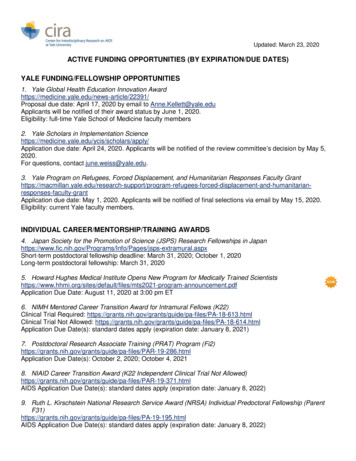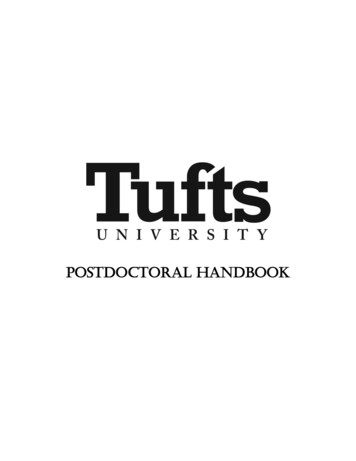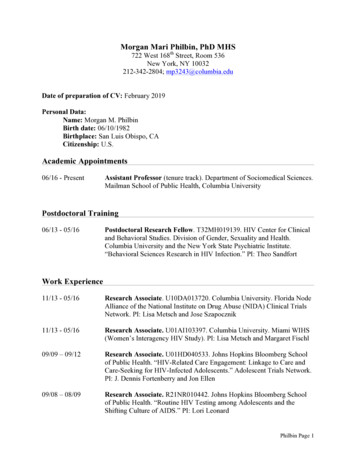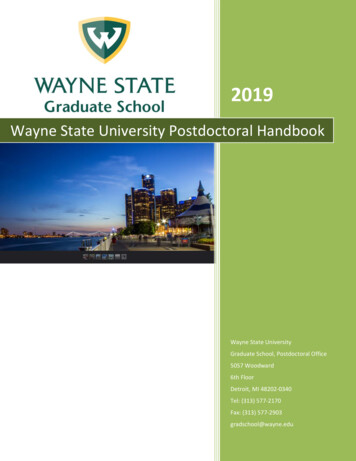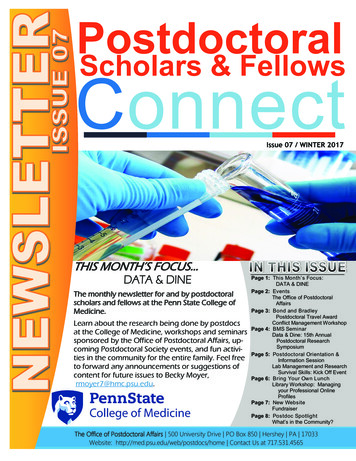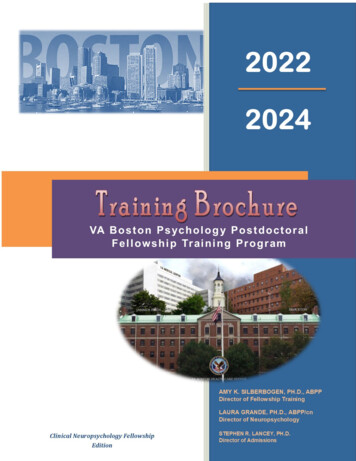
Transcription
Greetings!Jennifer J. Vasterling, Ph.D.Chief of Psychology – VA Boston Healthcare SystemChair, Executive Committee – VA Boston Healthcare System PsychologyTraining ProgramsAmy K. Silberbogen, Ph.D., ABPPDirector, Postdoctoral Fellowship Training ProgramLaura Grande, Ph.D., ABPP-CNDirector, Clinical Neuropsychology Fellowship Training Program
Clinical Neuropsychology Training ProgramLaura Grande, Ph.D., ABPP/cnDirector, Clinical Neuropsychology Postdoctoral Fellowship TrainingProgramJamaica Plain CampusFELLOWSHIP ADMINISTRATIVE GROUPDirector of AdmissionsStephen R. Lancey, Ph.D.Jamaica Plain CampusCurriculum CoordinatorDavid Topor, Ph.D.Brockton CampusResearch CoordinatorKaren Mitchell, Ph.D.Jamaica Plain CampusCommittee for Diversity and InclusionColleen Sloan, Ph.D.Scott Litwack, Ph.D.Jamaica Plain CampusAdministrative Officer for PsychologyTBDJamaica Plain CampusProgram Support AssistantMs. Tai Antoine, J.D., MPHMs. Neysa Wright, M.Ed.Jamaica Plain CampusCONTACT US AT:Psychology Service (116B)VA Boston Healthcare System150 South Huntington AvenueBoston, MA 02130Email: amy.silberbogen@va.gov or laura.grande@va.govWeb: wship.asp
ContentsGreetings.3Key Faculty and Staff.4Welcome.7Impact of COVID-19 on Training.8Philosophy and Model of Training.9Orientation to the Fellowship.9Teaching Methods.10CLINICAL NEUROPSYCHOLOGY TRAINING PROGRAM.12Program Aims.12Program Overview.16Training Components.17Neuropsychology Consult Service (NCS):.17
Long-Term Epilepsy Monitoring Unit:.17Geriatrics Clinic (formerly the GRECC clinic):.17Inpatient Rehabilitation:.17Post-Acute Acquired Brain Injury (PAABI) Clinic.17Amyotrophic Lateral Sclerosis:.18Memory Disorders Clinic:.18Movement Disorders.18Seizure Clinic.18Psychoeducational Groups:.18Individual Treatment:.19Didactic Seminars for All Fellows.19Neuropsychology Didactics.19Required Didactics.19
Additional Optional Lectures/Meetings:.20Diversity Focus.20Research.21Exit Criteria.21Staff.22Clinical Supervisors:.22Research Supervisors:.22(continued on next page)Graduation Day – July 24, 2019.23Program Wide Review and Remediation Procedures.24Evaluation Methods.24Due Process Policy.24Training Environment.25
Jamaica Plain Campus.25West Roxbury Campus.26Brockton Campus.26Diversity and Inclusion.27VA Boston Psychology Service Committee on Diversity and Inclusion.27Mental Health Multicultural Consultation Team.27ALANAS.28Support Services.28Research Activities.28Living Environment /Cost of Living.29Hours, Stipend, and Benefits.30APA Accreditation.31Eligibility.31
Application Process.32Application Materials.33Virtual Interview Days.33Process.34Statement of Nondiscrimination.34If an Offer Is Extended:.35Doctoral Degree Requirement:.35ACCEPTANCE OF A POSITION IS BINDING:.35Current Postdoctoral Fellows.36Recent Fellows First Post- Fellowship Position.37
Welcome to the VA Boston Psychology Postdoctoral FellowshipTraining Program!The structure of the VA Boston Psychology Postdoctoral FellowshipProgram follows a multiple practice format as defined by APA. TheFellowship Program is organized into two separate areas:1. the specialty practice area of Clinical Neuropsychology, and2. the substantive traditional practice area of Clinical Psychology.This brochure describes the training opportunities available in the ClinicalNeuropsychology Program. The VA Boston Psychology PostdoctoralFellowship Program anticipates it will recruit 2 full-time Fellows in thespecialty area of Clinical Neuropsychology.VA Boston also has a Clinical Psychology Training Program, where weoffer training in seven major areas of study. For additional information,please download the Clinical Psychology Training Brochure located on theFellowship homepage.Both Training Programs exist within the overarching structure of theFellowship Program and are independently accredited by APA. Our nextSite Visit will be in 2024.For many in the psychology community, “Boston VA” and“Neuropsychology” go hand in hand. Since the earliest days of the BostonVA, Neuropsychology has held a preeminent place as Harold Goodglass,Ph.D. served as the Chief of Psychology. Through his drive and vision, hefused psychological and neurological science with innovative, boundaryexpanding assessments and clinical services to neurologically impairedpatients. As a natural outgrowth, psychologists were drawn to this newfield of clinical neuropsychology and over time, a training programemerged through the talents, wisdom, and dynamic leadership of faculty.Many renowned neuropsychologists have shaped neuropsychology at VABoston, including Drs. Edith Kaplan, Laird Cermak, Nelson Butters,Howard Gardner, Marlene Oscar Berman, Dean Delis, Edgar Zurif, WilliamMilberg, and Meike Verfaellie. VA Boston has many funded researchcenters, including the former Harold Goodglass Aphasia Research Center,BU Memory Disorders Research Center (MDRC), and the TranslationalResearch Center for Traumatic Brain Injury and Stress Disorders. Somewell-known instruments have had Boston VA faculty involved in theirdevelopment, including the Boston Naming Test, the Boston DiagnosticAphasia Examination, the Delis-Kaplan Executive Function System, theCalifornia Verbal Learning Test, and revisions to the WAIS and WISC. Ifyou are seeking a career as a Clinical Neuropsychologist as a practitioner,a researcher, or a blend of the two, you will find VA Boston to be anextraordinary teaching environment to achieve your goals.
Broadly speaking, postdoctoral training has shifted considerably over theyears; the purpose of postdoctoral training is to gain advancedcompetency development in either a recognized specialty area ofpractice (i.e., our accredited Clinical Neuropsychology program) or in aspecific focus area (i.e., VA Boston’s “Tracks” within our accreditedClinical Psychology program). We strongly believe that formal training atan accredited postdoctoral training program does offer many benefits,particularly for those who aspire to be clinical neuropsychologists.Specifically, formal training builds confidence and professional identity,the development of advanced competence across all domains of practicewithin Clinical Neuropsychology, and the facilitation of short- and longterm career goals, including licensure and board certification. APPIC’sjournal, Training and Education in Professional Psychology, published aspecial edition on postdoctoral training in 2018. We include a link here toan article (by Dr. Silberbogen and colleagues) that reviews the purpose ofpostdoctoral training in the sequence of training, and outlinesconsiderations when making important decisions about publication/325207464 Postdoctoral training in health service psychology Current perspectives in an evolving profession.TIMPACT OF COVID-19 ON TRAININGhe COVID-19 pandemic has had an unprecedented impact on allaspects of personal and professional life, requiring flexibility,adaptability, and ingenuity. The VA Boston Psychology PostdoctoralTraining Program has been successful throughout the pandemic inremaining steadfast in our commitment to providing high-quality clinicalcare for Veterans and high-quality training to our psychology trainees.Our psychology staff and trainees pivoted quickly in March 2020 totelecare and telesupervision, and supported our trainees in navigating allaspects of providing telecare, including learning new platforms, providingpsychotherapy and assessments remotely, setting up homeenvironments to facilitate privacy and functionality, addressing personalchallenges (e.g., shared workspaces with partners, child care, longdistance from loved ones) and facilitating community and connection.Dr. Silberbogen and Dr. Grande routinely meet with the class ofpostdoctoral Fellows to ensure transparency, to address questions, andto problem solve barriers. Despite the number of uncertainties thatCOVID-19 has brought, our value of providing outstanding training andour skill in implementing this value has been constant.The clinical experiences listed within this brochure are current, and alltraining experiences are anticipated to be available during the 2022-2024training years. At the time of this writing (9/2021), most of ourpostdoctoral Fellows are on-site 3-5 days per week, in line with theirclinical settings, and teleworking the remaining days. Our Fellows areinstructed to follow safety procedures consistent with CDC and localfacility guidelines, including mandatory screening upon presenting at the
hospital, mandatory masking and PPE requirements, social distancing,cleaning protocols, and hand washing. Additionally, the use of plexiglassbarriers (i.e., “sneeze shields”) are available.In addition to virtual and in-person assessments for our NeuropsychologyConsult Service, our trainees have continued to participate andcontribute to the clinics and rotations described below including:Geriatrics, Memory Disorders, Seizure/PNES, ALS, Movement Disorders,and Rehabilitation Medicine. Staff have worked to make certain thattrainees remain engaged in meaningful neuropsychological activitiesduring this time. In fact, the Memory Disorders rotation came about as anew collaboration between Neuropsychology and Neurology during thepandemic and is a clinical experience we will continue to offer in thefuture. Neuropsychology trainees have consistently maintained theirclinical hours during the pandemic.Clinical supervision remains consistent with APA accreditation guidelines(minimum of 2.0 hours per week). Supervisors meet with their traineeseither in person or virtually by a number of video-based platforms(WebEx, Microsoft Teams). Currently, didactics and team meetings areoffered remotely. Given some of the challenges of working remotely, wework to ensure our current class of Fellows is feeling connected with thebroader psychology community; community building will remain a highpriority.We anticipate that the 2022-2024 Fellows will continue to engage insome hybrid mix of remote and in-person work, consistent with thedemands and requirements of their specific clinical placements. We lookforward to describing our modifications during our virtual interviews andto address any concerns/and or questions regarding our COVID-19modifications. VA Boston is confident in its ability to provide high qualitytraining and mentorship to promote the professional development of ourFellows, despite the challenges brought on by COVID-19.Please note that references to “direct”, “face-to-face” or “in-person”clinical care or supervision, are also inclusive of remote and virtual careduring the COVID-19 pandemic. In addition, we have retainedreferences to campus-based locations in this brochure so thatapplicants are informed of where they would be located for in-personservices.TPHILOSOPHY AND MODEL OF TRAININGhe VA Boston Psychology Postdoctoral Fellowship model for trainingentails four broad, core components. Training is:1.Individualized, graduated, and primary: Training isindividualized, such that we aim to build professional identity and
responsibility through involvement in the training process. Inother words, we ask that Fellows collaborate with their facultymentors and supervisors to develop a training plan that meetstheir specific training and career goals based on a needsassessment and discussions with faculty. Training is structuredaround those specific goals and increases in complexity andresponsibility over the course of the training year. Servicedelivery is the means by which training, and enrichment occur;however, service delivery is secondary to the broader mission oftraining.2.Based on a scientist-practitioner model: We employand model a scientist-practitioner approach to clinicalneuropsychology, wherein empirically supported knowledgeinforms neuropsychological assessment and intervention, andwherein questions arising from clinical practice drives researchendeavors. Training involves empirically supported treatmentsand assessment methods and ensures that Fellows utilize criticalthinking skills to develop their own clinical research questionsand/or program development/evaluation projects. This goal isgreatly facilitated by the rich and diverse clinical research settingoffered by the training sites. VA Boston is home to numerousNational Research Centers and Centers of Excellence, with overthirty federally funded grants in the field of Mental Health andSubstance Abuse. This wealth of research resources creates anatmosphere that embodies the scientist-practitioner model.3.Sensitive to individual differences: We work to identify,respect, and nurture the unique personal attributes that theFellow brings. The training environment is supportive and guidedthrough close collaboration with supervising faculty. Our trainingprogram is sensitive to individual differences and diversity andvalues the enriched educational environment that occurs withina diverse group of trainees and staff. Training involves selfawareness related to cultural factors, as well as appreciatingthose social and cultural factors that influence patient centeredcare. For the ways in which VA Boston attends to and addressesindividual “lived” differences in our trainees and patients, pleasesee our “Diversity and Inclusion” section. This section describesadditional program and service wide resources.4.Collaborative: We utilize a “junior colleague” model oftraining. Our commitment to the Fellows’ professional growthand scholastic development is conveyed in a supportive trainingatmosphere emphasizing individual strengths. Our majorresource in this endeavor is the significant investment ofenthusiasm, energy, and time of our training staff, includingpsychologists and non-psychology supervisors. Fellows arechallenged to think critically, and constructive criticism is offered
in a non-threatening manner to encourage the Fellow’s fullparticipation in all endeavors, scientific and clinical. We providetraining in multidisciplinary and interdisciplinary careenvironments in which the Fellow develops confidence as a localmental health expert who collaborates effectively with a range ofproviders in the context of a large medical system. Fellows willlearn to work effectively with a variety of other disciplines, aswell as collaborate with other mental health practitioners inclinical and research domains.AORIENTATION TO THE FELLOWSHIPll Fellows in the Clinical Neuropsychology Training Program aresupported from Sunday, August 14, 2022 through Saturday, August12, 2024. The Orientation to the Fellowship begins on Monday August15, 2022. The organization of the Fellowship Program provides Fellowsaccess to different populations and an opportunity to assume a variety ofroles. The Fellowship includes clinical, research, and educationalcomponents, described below.STEACHING METHODSupervised Service Delivery in direct contact with service recipients.Year 1 Neuropsychology Fellows will spend a minimum of 25% (10hours) of their week engaged in direct, face-to-face clinical care. Asappropriate for training, face-to-face patient encounters are but onecomponent of service delivery, and delivery of patient care is secondaryto the educational mission of the training. In addition, there arenumerous activities that the Fellow will engage in that are in support offace-to-face clinical care. The combination of face-to-face clinical careand all supportive clinical functions (e.g., consultation with otherproviders, report writing, medical record review, supervision, andprovision of supervision) will comprise approximately 75% of a Fellows’training.The primary training method for Year 2 Neuropsychology Fellows is alsosupervised service delivery in direct contact with service recipients.However, as appropriate for neuropsychology education and training,and depending on the specific goals of the Fellow, Year 2 may allow foradditional research time. During Year 2, Neuropsychology Fellows willspend a minimum of 60% of their time engaged in supervised servicedelivery (a minimum of 6 face-to-face hours per week and a minimum of18 hours in supportive clinical functions, as described above).Supervision: Fellows receive at least two hours of individual, face-to-face,scheduled supervision with a licensed psychologist who has expertise inthe activities being supervised. Fellows may also receive group
supervision, with a maximum of three trainees. Fellows receivesupervision from a minimum of two licensed psychologists during thetraining year, one of whom is identified as the “primary” mentor. Aminimum of 2.5 hours of supervision per week (individual supervisioncomprising at least two hours) is required throughout the training year.Other Structured Learning Activities: Fellows participate in a minimumof 1.5 additional hours of other structured learning activities, includingprogram-wide and track specific didactics, team meetings, rounds, andcase conferences. On average, Fellows participate in approximately 2 –4 hours of other structured learning activities.Scholarly Mentorship: While the primary focus of the fellowship trainingprogram is the development of clinical skills, we provide an array ofclinical research and other scholarly inquiry opportunities. All fellows willselect a research mentor who will supervise these activities. First yearClinical Neuropsychology Fellows are expected to have a minimum offour (4) hours of protected time within their regular schedules to bedevoted to research and scholarly activities. These four hours are seenas a base, but fellows can avail themselves of research opportunitiesbeyond these dedicated hours (up to 10 hours per week) throughdiscussion with their supervisors and research mentor. Second yearNeuropsychology Fellows may increase their protected research time (upto 14 hours per week) if this is consistent with their training plan andoutlined goals. Fellows may collaborate with faculty on ongoing researchor a program evaluation project, participate in research lab meetings andother team collaborations, or design and implement an independentresearch project under the mentorship of a faculty member. Activitiesmay include reading and literature searches, consulting on andparticipating in some of the daily tasks of data collection and coding, dataentry, and data analysis, as well as developing posters or presentations,and manuscript presentation. Fellows are encouraged to present theirwork in local, regional, and/or national educational settings, or submitwork for publication as appropriate. Additionally, Fellows present theirresearch progress during Fellowship wide didactics towards the end oftheir training year.Didactic Seminars:All Fellows attend a biweekly seminar chaired by David Topor, Ph.D.,Curriculum Coordinator, during Year 1 with their Clinical PsychologyFellow colleagues. Year 2 Fellows may opt to attend the program widedidactics, though it is not required.During didactics, we develop a sense of professional community and peersupport during Fellowship. Topics are scheduled based on a NeedsAssessment completed by Fellows at the start of their training. Speakersare invited to present didactics on professional development issues,leadership, ethics, supervision, diversity and ethnicity, and professional
identity. Several didactics that are directed at teaching specificevidenced based psychotherapy are shared with clinical psychologyinterns.In addition to program wide didactics, many elective seminars areannounced throughout the training year. Risa Weisberg, Ph.D., and ErikaWolf, Ph.D., coordinate a weekly Grant Writing Seminar throughout thetraining year. Additionally, Fellows are invited to attend the one-hourbimonthly Research Fellows’ seminar series developed by Daniel Lee,Ph.D. (e.g., Grant Mechanisms, Understanding VA Funding, Transitioningout of the Role of a Fellow).Finally, Fellows are expected to attend the Psychology Service’s annualPsychology Education Day (a training day for staff and trainees gearedtoward particular themes). Recent themes for past Training Daysincluded interprofessional training, positive psychology, DSM-V, ethics,mentorship and supervision issues, multicultural issues in clinicaltreatment, patient advocacy, and returning veterans.Neuropsychology specific didactics are described in greater detail below.Non-evaluative Mentor:Each Fellow selects a Non-Evaluative Mentor (NEM) from among facultymembers, who will serve as a year-long mentor for the trainee (secondyear Neuropsychology Fellows are encouraged to either maintain thesame NEM from their Year 1 experience or connect with a newNEM). The NEM may represent an area of particular clinical or researchinterest for the trainee or may be a psychologist whose background orother qualities (e.g., ability to speak to balancing career and family life,including being a parent or caring for ill/elderly family members) is ofrelevance. The NEM may be linked to the trainee’s training experiencesbut cannot be a direct supervisor or evaluator of the trainee. The NEMprovides counsel and is meant to assist the trainee in the overallcoordination of their training experiences throughout the year. Examplesof areas that might be discussed during meetings could include issuesrelated to professional development, identity development, octoralapplications/decision making, among others.
THE FELLOWSHIP TRAINING PROGRAMS OF VA BOSTONCLINICAL NEUROPSYCHOLOGY TRAINING PROGRAMThe Clinical Neuropsychology Training Program is independentlyaccredited by APA but functions within the structure and administrationof the VA Boston Psychology Postdoctoral Fellowship Program. LauraGrande, Ph.D., ABPP/cn is the Director of the Clinical NeuropsychologyPostdoctoral Fellowship Program and Susan McGlynn, Ph.D., ABPP/cn isthe Associate Director. While not the focus of this Training Brochure,please note that the separate Clinical Psychology Training Programprovides opportunities for training in eight areas of emphasis. Theseinclude: Addiction Recovery, Behavioral Medicine, Geropsychology,Interprofessional General Mental Health, LGBT Health Care,Posttraumatic Stress Disorder, and Post-Deployment Readjustment andTrauma Related Disorders.LAURA GRANDE, PH.D., ABPP/cnDirector of Neuropsychology TrainingVA Boston Healthcare System (116B)150 South Huntington AvenueBoston, MA 02130SUSAN MCGLYNN, PH.D., ABPP/cnAssociate DirectorVA Boston Healthcare System (116B)150 South Huntington AvenueBoston, MA 02130Telephone: (857) 364-6810Email: laura.grande@va.govTelephone: (857) 364-4248Email: susan.mcglynn@va.govTraining Locations:Jamaica Plain Campus, West Roxbury Campus, and Brockton CampusNumber of Fellows:Two full-time Fellows are admitted each year.Program Aims
The aim of the VA Boston Psychology Clinical Neuropsychology Fellowship Program is to train clinicalneuropsychologists who meet advanced practice competencies (see below) in the specialty practicearea of clinical neuropsychology and who can function effectively as professional neuropsychologists in abroad range of roles and settings, including clinical services, research, and education.The structure of the VA Boston Psychology Clinical Neuropsychology Fellowship Program fostersdevelopment across competencies consistent with the specialty area of Neuropsychology. The programadheres to the Houston Conference standards (Archives of Clinical Neuropsychology, 1998, 13, 160-166)for specialty training in clinical neuropsychology, as described by Division 40 of the American PsychologicalAssociation (APA), and meets req
adaptability, and ingenuity. The VA Boston Psychology Postdoctoral Training Program has been successful throughout the pandemic in remaining steadfast in our commitment to providing high-quality clinical care for Veterans and hiquality training to our psychology trainees. gh-Our psychology staff and trainees pivoted quickly in March 2020 to


